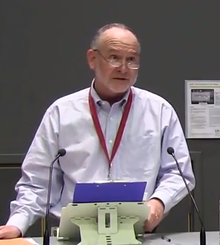James Ferguson (anthropologist)
Appearance
James Gordon Ferguson | |
|---|---|
 Ferguson at the University of Sussex, July 2016 | |
| Born | June 16, 1959[3] |
| Nationality | American |
| Occupation(s) | Professor, scholar |
| Title | Susan S. and William H. Hindle Professor in the School of Humanities and Sciences[4] |
| Academic background | |
| Education | B.A., M.A., Ph.D. |
| Alma mater | University of California, Santa Barbara, Harvard University[1] |
| Thesis | Discourse, knowledge, and structural production in the "development" industry : an anthropological study of a rural development project in Lesotho[2] (1985[2]) |
| Academic work | |
| Discipline | Anthropologist |
| Sub-discipline | Development studies |
| Institutions | Stanford University (2003 - ) University of California, Irvine (1986-2003)[1] |
| Main interests | Political economy, Development studies, Migration[1] |
James Ferguson (born June 16, 1959) is an American anthropologist. He is known for his work on the politics and anthropology of international development, specifically his critical stance (development criticism). He was chair of the Anthropology Department at Stanford University.[4] His best-known work is his book, The Anti-Politics Machine. He delivered the most prestigious lecture in anthropology, the Morgan Lecture, in 2009, for his work on basic income. He earned his B.A. in cultural anthropology from the University of California, Santa Barbara and an M.A. and Ph.D. in social anthropology from Harvard University.[1]
Selected publications
- 2015, Give a Man a Fish. Duke University Press
- 2010, The Uses of Neoliberalism. Antipode, volume 41, supplement 1, 2010.
- 2006, Global Shadows: Africa in the Neoliberal World Order, Duke University Press.
- 1999, Expectations of Modernity: Myths and Meanings of Urban Life on the Zambian Copperbelt, University of California Press.
- 1997, Editor, Anthropological Locations: Boundaries and Grounds of a Field Science (with Akhil Gupta), Univ. of California Press.
- 1997, Editor, Culture, Power, Place: Explorations in Critical Anthropology (with Akhil Gupta), Duke University Press.
- 1990, The Anti-Politics Machine: 'Development,' Depoliticization, and Bureaucratic Power in Lesotho, Cambridge University Press. Republished in 1994 by University of Minnesota Press.
References
- ^ a b c d Ferguson, James (May 2015). "Curriculum Vitae - James Ferguson" (PDF). Stanford - Department of Anthropology. Stanford University. Retrieved November 5, 2016.
- ^ a b Ferguson, James Gordon (1985). Discourse, knowledge, and structural production in the "development" industry : an anthropological study of a rural development project in Lesotho (Ph.D.). Harvard University. OCLC 19506355. Retrieved November 5, 2016.
- ^ "Ferguson, James, 1959-". Library of Congress Name Authority File. Library of Congress. Retrieved November 5, 2016.
- ^ a b "James Ferguson". Stanford - Department of Anthropology. Stanford University. Retrieved November 5, 2016.
External links
- Ferguson's faculty profile at Stanford
- Interview with James Ferguson by 'Theory Talks'
